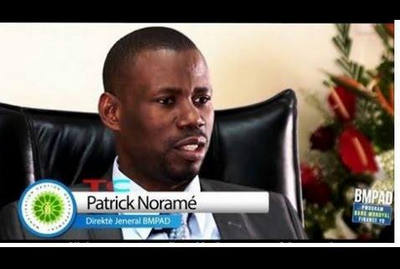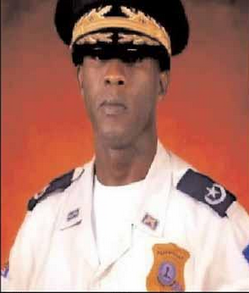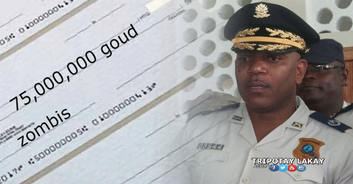
August 26, 2019 08:42 PM, Updated August 27, 2019 01:30 AM
Haiti’s National Police are ready to take the lead, director says
Haiti National Police Director Michel-Ange Gédéon says he has confidence in the training of officers to take over once U.N. forces leave the island nation.
A month after arresting one of Haiti’s most wanted gang leaders and exposing a troubling connection between gang leaders and a member of the nation’s parliament, the head of the country’s beleaguered police force is out of a job.
Haiti National Police Director Michel-Ange Gédéon was told on Monday by Haiti President Jovenel Moïse that he would not be staying on, and that his replacement would be announced as early as Tuesday morning.
(HT: Gedeon’s arrest of gang-leader Arnel Joseph was a carefully staged game to promote his retention as PNH Chief on August 26, 2019. He was in constant contact with Arnel Joseph before, and after the gang-leader slipped into the Artibonite. He could have arrested him at any moment.Constant GPS phone tracking gave Gedeon Arnel Joseph’s current position within a few yards, at any moment.)
The president did not say who the next chief would be. But those familiar with the decision said the choices come down to two individuals: Normil Rameau, Gédéon’s one-time No. 2 and former head of Haiti’s Central Directorate of the Judicial Police; and Noel Charles Nazaire, the head of the country’s prison system. Rameau, who is currently assigned to the Haitian embassy in Washington, was told last week by the presidential palace to report to Port-au-Prince.
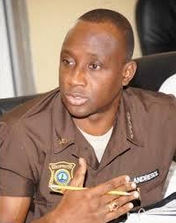
(HT: We didn’t have a gang problem under Mario Andresol. Gedeon created the gang problem as a weapon of destabilization, part of Privert’s plan to derail President Moise.)
“Under my tenure, bandits always had to be worried regardless of their political affiliation,” Gédéon, 46, said Monday, summarizing his three years as Haiti’s top cop.
In Haiti, he said, bandits are everywhere — in the city, in the countryside, the slums and the villas — and Haitians must continue to “fight mercilessly against bandits and traffickers of all kinds.”
(HT: Bandits were never worried under his tenure. Gedeon would phone leaders to warn of PNH actions. Gedeon’s tenure saw a rapid expansion of gangs in Haiti. They are everywhere because Gedeon has ignored or blocked efforts to control this danger to society. Some of his PNH officers held positions in major gangs.)
Gédéon was appointed to the job in 2016 by interim Haiti President Jocelerme Privert and ratified by the Haitian Senate, but his mandate expired last week. Moïse, who has authority under the constitution to appoint the police chief, could have named him to a second term. Some observers in the international community, which funds most of the police force, wanted him to keep Gédéon on the job.
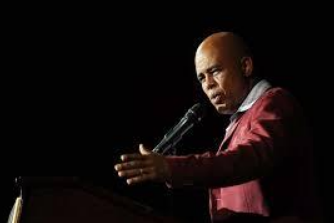
(HT. Gedeon was put aside for 2 years, under Martelly’s government, for cause. A Lavalas activist, Gedeon was recalled to become PNH Chief by Privert, during the criminal Privert pirated Presidency. Gedeon, along with the BRH Governor, were appointed for three years by Privert, placing time-bombs in Jovenel’s government. Moise has shared authority with the Chamber of Deputies and Senate, under the terms of Article 141 of the Haitian Constitution.)
But despite months of lobbying by foreign diplomats in Port-au-Prince for continuity in the 15,937-member police force, Moïse decided to let Gédéon go and appoint his own chief.
(HT. Very little lobbying, if any. Amerticans have pressed for Rameau over the past two years. Jovenel should have had the option of appointing his own chief when taking office Privert’s fait accompli gave him Gedeon.)
The switch in command comes as Haiti continues to undergo a worsening political and economic crisis with no functioning government and Moïse continues to face calls for his resignation from political opponents and anti-corruption grassroots activists. It also comes as the United Nations prepares to permanently end its peacekeeping operation in October after 15 years.

(HT: The UN is Haiti has been a very expensive failure. Now, they declare Victory and depart.”)
Rebuilding the Haiti National Police and training police officers have been key priorities for the U.N.., which in its most recent report from the secretary-general to the U.N. Security Council warned that “without stronger support from the government and the international community, Haiti’s police force risks losing the gains” in professionalization it has achieved.

(HT: Gedeon was totally political and his politics were ant-Jovenel, pro Aristide/Privert. No secrets here for anyone who looks!)
Some of those gains, Gédéon said, came under his tenure. He credits his administration with not only making the police more professional, but less political. Among some of the measures carried out under his leadership: adding more women to the force; providing more training opportunities for officers at the Inter-American Defense College in Washington and similar institutions in Chile; and promoting officers to middle management positions.
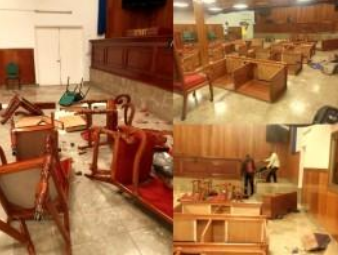
(HT: Under Gedeon’s leadership the PNH was faced with ongoing situations in which PNH officers, on the street, would find Gedeon, and other ranking officers, shut their phones off, in times of emergency, denying proper coordination during emergencies PNH officers died because of this.)
Another significant achievement, he said, was tackling corruption in the force. Under his leadership, the institution recovered 834 weapons from no-longer-active officers and recuperated thousands of dollars in money that was still being paid to fired or deceased cops.
(HT: How many weapons did Gedeon knowingly supply to his own gang contacts? 834 weapons over 3 years, WOW! Fewer than one gun per day! Gedeon coordinated thousands of Zombi checks.)
But that’s not all, said Pierre Esperance, a leading human rights advocate in Haiti, who initially was unsure about Gédéon, the former police chief of west region — which includes Port-au-Prince. Gédéon had been dismissed by former Haitian President Michel Martelly and spent two years on the sidelines before being tapped by Privert.
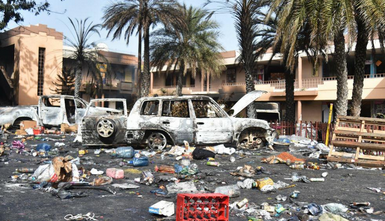
“Our experience with Gédéon has been nothing but positive. Under him, the police had courage,” Esperance said, referring to two police investigations, one on the November 2018 massacre in the La Saline neighborhood of Port-au-Prince, in which two presidential appointees were implicated, and the other on gang leader Arnel Joseph, which exposed his relationship with Sen. Garcia Delva.
(HT: Esperance is a questionable quantity in Haitian society. He seems to publish what cash will pay for. His recent report was full of outright fallacies – well, let’s call them lies! The 2 guys involved with La Saline were not Jovenel’s appointees. Their loyalty was elsewhere.)
The first police chief to rise through the ranks and not the army, Gédéon is widely respected among officers who view him as an inspiration in a country where former police chiefs usually came out of the military.
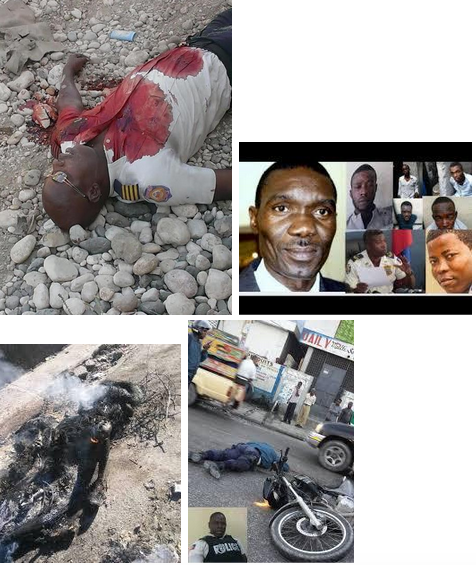
(HT: other than the fact that he rose through the ranks, the rest is Bull Shit. The senior PNH officers we talked to all threatened Mutiny should president Moise decide to retain Gedeon. His inner Lavalas circle might respect him, but not the rest. Junior officers detested him for the danger he put them in. Many died!!)
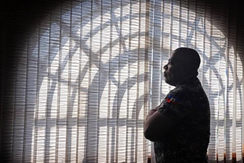
A GOD LIKE Director of the Haiti National Police, Michel-Ange Gedeon, is photographed inside his office in Petion-Ville, Haiti on Monday, February 18, 2019. Carl Juste cjuste@miamiherald.com
Still, he and Moïse have a contentious relationship at best. Supporters of the president often wanted Gédéon to be repressive against protesters, and didn’t like his push back on their attempts to politicize the police. With few resources, he regularly led a force that was ill-equipped to intervene in gang-affected areas, or even regular policing.
(HT: Three years that has seen the PNH deteriorate as a force of law-and-order to the point that it will take years to rebuild it.)
“He’s a professional. He always listened to his officers. However, he was working with bare bones. People sometimes commend the job the police are doing but they have no idea under what conditions they do it with,” Esperance said. “Gédéon spent three exceptional years as the head of the police where the executive fought him for no reason. [Gédéon] was loyal to the authorities.”

If there is another trait that Gédéon should be commended for, Esperance said, it’s the fact he “doesn’t do repression against the protesters.”
(HT: What this means is he does not enforce the law and act against violent, illegal protests that destroy property and assault people. Hardly something to commend a police chief for. )
Still, Gédéon has come under fire as Haiti has witnessed a resurgence in gang activities and insecurity in the past three years. Last July, when protesters shut the country down for three days, many questioned whether Gédéon and the police were up to the task.
“The [HNP] is often singled out for every spurt of acts of banditry because our society is facing a lack of training and information,” Gédéon said Monday. “The police cannot fight disorder alone and can only take social control; other actors and social groups must be involved. Security is a collective job.”
June 21, 2019 7:19 PM
Gédéon leaves the job after his cops made two of the most highly celebrated arrests in recent memory: drug trafficker and rebel leader Guy Philippe, and Joseph, the wanted gang leader.
Philippe, a newly elected Haitian senator at the time of his capture by U.S. Drug Enforcement Administration agents and Haitian police, was arrested in January 2017, months after Gédéon officially took over. Joseph’s arrest came last month after a manhunt that lasted more than two years.
Joseph’s arrest briefly sparked a campaign among some in the population for a renewal of Gédéon’s term by Moïse.
Frustrated by his inability to control the police, Moïse told an audience in Miami at a public meeting he planned to ask his prime minister to invite him to a gathering of the police council so that he could give directives on security measures. Later his administration told Gédéon that he had to run all administrative changes by the prime minister first.
(HT: Jerry Tardieu couldn’t even run a “Moment” the Haitian term for an in-and-out bordello… in the form of the Hotel Oasis.)
Parliament member Jerry Tardieu, who introduced a law in 2016 to modernize Haiti’s police force, said if Gédéon and Moïse enjoyed a better relationship the police could have accomplished more.
“If I were the president, I would have rallied him to my side and given him all of the resources he needed,” Tardieu said. “I think his three years were diminished by the fact that the president never trusted him and did not allow him much margin to maneuver. He could have done more, but had to pay a price because of this ongoing suspicion on the part of the president.”
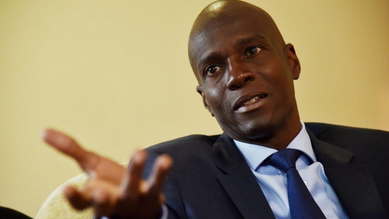
(HT: The relationship was planned, and predictable, from daty one, after Privert appointed Lavalas militant Gedeon to be Director General PNH. Don’t blame the lack of cooperation on President Moise. He reached out, on many occasions, only to be rebuffed by Gedeon.)
Gédéon conceded that the “up-and-down” relationship had “counterproductive consequences for both the security governance and political governance.”
He added that while he has always stressed that the Haiti National Police needs to “remain apolitical and a public service institution,” few people are tolerant of individuals who adhere to this philosophy.
“In a society as polarized and confrontational as Haiti, the desire to have control over the country’s public force, be it the army or the police, has always tried almost every government.”
Haiti National Police Director, Michel-Ange Gedeon, says Haiti today has a different, more professional police force.

(HT: That comment wins Gedeon a ‘Pinocchio’ from our staff.)
_________________________________________________
COMMENT: HAITIAN-TRUTH.ORG
If this type of article appeared in Le Nouvelliste people would ask how much the subject paid.
Since this fiction appears in the Miami Herald, we cannot think those bad thoughts, to explain the blind bias on behalf of a mediocre, at best, terrible, at worst police chief who did everything possible to diminish the effectiveness of the PNH during his mandate.

The Miami Herald has a reputation for exceptional investigative reporting and this could also extend to Haiti. How about a real investigation into the BMPAD chief, Patrick Norame, presently hiding out in Boca Raton. There seems to be a stolen $80,000,000 involved.
His property is listed with State so he isn’t hard to find.
